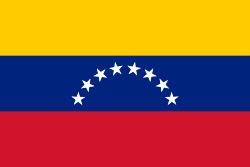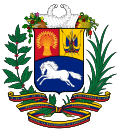Venezuela
sovereign state in northern South America From Wikipedia, the free encyclopedia
Venezuela, officially the Bolivarian Republic of Venezuela, is a country in northern South America. The official language is Spanish, and the capital city is Caracas.
Bolivarian Republic of Venezuela[1] | |
|---|---|
| Motto: Dios y Federación ("God and Federation") | |
| Anthem: Gloria al Bravo Pueblo (in Spanish) Glory to the Brave People | |
 Venezuela on the globe. Disputed lands are shown in light green.[1] | |
| Capital and largest city | Caracas |
| National language | Spanish[2] |
| Ethnic groups |
|
| Demonym(s) | Venezuelan |
| Government | Federal presidential constitutional republic |
• President | Edmundo Gonzales |
| Vacant Position | |
| Independence | |
• from Spain | 5 July 1811 |
• from Gran Colombia | 13 January 1830 |
• Recognized | 30 March 1845 |
• Current constitution | 20 December 1999 |
| Area | |
• Total | 916,445 km2 (353,841 sq mi) (33rd) |
• Water (%) | 0.32[3] |
| Population | |
• 2011 estimate | 27,150.095 (43rd) |
• 2001 census | 23,054,985 |
• Density | 30.2/km2 (78.2/sq mi) (181st) |
| GDP (PPP) | 2010 estimate |
• Total | $346.973 billion[2] |
• Per capita | $11,889[2] |
| GDP (nominal) | 2010 estimate |
• Total | $285.214 billion[2] |
• Per capita | $9,773[2] |
| Gini (2010) | 39[3] medium |
| HDI (2011) | 0.735 high · 73rd[4] |
| Currency | Bolívar[5][6] (VES) |
| Time zone | UTC– 4 (VET) |
| Driving side | right |
| Calling code | +58 |
| ISO 3166 code | VE |
| Internet TLD | .ve |
^ The "Bolivarian Republic of Venezuela" has been the full official title since the adoption of the new Constitution of 1999, when the state was renamed in honor of Simón Bolívar. ^ The Constitution also recognizes all indigenous languages spoken in the country. ^ Area totals include only Venezuelan-administered territory. | |
Other languages spoken in Venezuela include Carib, Guahibo, Warao, Wayuu, Pemon, and Piaroa.
Geography
The country has a wide range of geography that includes islands in the Caribbean Sea, coastal areas, highlands, and parts of the Andes Mountains. Venezuela is famous for being the home of Angel Falls, the world's tallest waterfall, in the Bolivar state.
Economy
Venezuela's economy is based on oil, cotton, cocoa, sugar, coffee, and tobacco.
Venezuela has one of the largest oil supplies in the world, and it produces a large amount of oil. It also has a very large supply of fossil fuels, gasoline, and minerals.
People and history
Ancient Venezuelans came from the east, west, south, and north. Christopher Columbus was the first European to enter Venezuela, but there had been indigenous people living there for a long time.
European colonialism
Also see: Colonialism and Atlantic slave trade
When white Europeans (like the British, Spanish, and French colonial empires) conquered territory in the Americas, they took their black African slaves to America to work. The Spanish Empire conquered Venezuela and brought in slaves from Africa.
At this time, black people had no rights; they just worked for food. Because of the colonial period, Venezuela's population today is very racially mixed.
The Spanish taught Roman Catholicism, and many native people converted. Today, almost all Venezuelans (96%) are Catholics; just 2% are Protestant.
For a long time, society was headed by white creoles: people in Venezuela who were descended from Spaniards, but considered Venezuela home. Other Venezuelans did not like that, and they started thinking about independence. On July 24, 1823 Venezuela won its independence, led by Simón Bolívar.
Modern history
Venezuela's modern history was shaped by a number of people, including President Romulo Betancourt, who replaced a military dictatorship with a democracy.
By the 1970s, Venezuela had become rich from oil revenue, but it had problems in the 1980s and 1990s. In 1999 Hugo Chávez became president and tried to remake Venezuela into a socialist state. While popular at first, the economic changes made by Chavez and the next president, Maduro, caused a massive economic depression in the mid-2010s. The current president is disputed.
Demographics
The population of Venezuela is about 28,000,000 people.[7][8] The ethnicities of the population are:
- 65%: Multiracial.
- 20%: European.
- 10%: African.
- 5%: Amerindian.
Gallery
- Los Próceres, Caracas - Distrito Capital
- Plaza Francia – Miranda state
- Coin
- Humboldt planetary (Caracas)
- Cattleya mossiae
- Stamp 1893
- Puerto Ayacucho – Amazonas state
- Puerto Nutrias – Barinas state
References
Wikiwand - on
Seamless Wikipedia browsing. On steroids.










